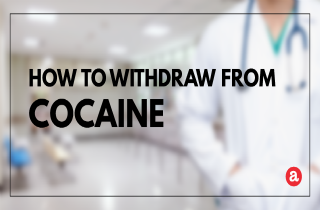ARTICLE OVERVIEW: Cocaine withdrawal can have intense psychological effects, but is a necessary part of treating cocaine addiction. Most people don’t know that cocaine withdrawal can be both safe and effective. Find out more about the symptoms of cocaine withdrawal syndrome and how to cope with them here. Then, ask your questions about how to withdraw from cocaine at the end.
TABLE OF CONTENTS:
- When Do You Withdraw From Cocaine?
- How Long To Withdraw From Cocaine?
- Withdraw From Cocaine Symptoms
- How To Ease Withdrawal Symptoms From Cocaine?
- How To Withdraw From Cocaine Safely
- Can I Withdraw From Cocaine At Home?
- The Best Way To Withdraw From Cocaine
- How To Deal With Withdrawal From Cocaine Questions
When Do You Withdraw From Cocaine?
You can expect to withdraw from cocaine as soon as the effects of cocaine wear off, even after your first use. Why is this? Cocaine use produces a stimulation effect in the brain by releasing a higher level of the biochemical dopamine. This causes a sensation of extreme joy or happiness. But the crash after using cocaine feels awful. You may feel fatigued, discontent, and depleted. Natural levels of dopamine are low. So whether you need help cocaine addiction or just coming of a high, you can expect to withdraw from cocaine.
Following a period of extended use, your body and mind may become dependent on cocaine in order to function normally. Dependence on cocaine is also characterized by tolerance, which means that you need to use more to gain the sensation of extreme joy, or the sensation that occurred when you first began use. If you have a tolerance and dependence on cocaine use, choosing to withdraw is a good idea. Expect withdrawal from cocaine to be a little more intense, with more severe symptoms.
How Long To Withdraw From Cocaine?
Cocaine use is characterized by a short-lived, very intense high, which causes certain withdrawal symptoms to occur within an hour of following the last use. The earliest onset of cocaine withdrawal symptoms comes in the form of extreme cravings. You will also experience the effects of a “crash”, which is your body returning to a state of functioning without cocaine. Crashing causes severe exhaustion and dysphoria (dissatisfaction with life) until your body reaches a state of normal functioning.
Aside from the immediate symptoms of cocaine withdrawal, there are also symptoms that may be present for weeks or even months. Depression and craving are symptoms that can be present for a very long period of time following the final use of cocaine. It is important to seek treatment, such as behavioral therapy, in order to address the psychological symptoms of cocaine withdrawal because of their severity and the length of time in which you will be affected.
Withdraw From Cocaine Symptoms
Cocaine withdrawal symptoms vary slightly from alcohol and other drugs because there are typically no physical signs of withdrawal, such as nausea or shakiness. However, when withdrawing from cocaine there are still very prominent symptoms that you will face. Withdraw from cocaine symptoms typically include:
- Agitation.
- Depressed mood.
- Dissatisfaction with life.
- Fatigue.
- Generalized malaise.
- Increased appetite.
- Restlessness.
- Slowing of activity.
- Vivid and unpleasant dreams.
When withdrawing from cocaine, you will also face severe cravings for more use. Cravings are one of the most difficult symptoms to face during the time of withdraw, because it makes it extremely difficult to abstain from use. When you decide to withdraw from cocaine, make sure you have are prepared for extreme cravings in order to avoid continued use.
How To Ease Withdrawal Symptoms From Cocaine?
Currently there are no medications that ease withdrawal symptoms from cocaine. Because of this there is a temptation for people to use alcohol, sedatives or hypnotics to treat the symptoms of cocaine withdrawal. However, it is not recommended that you take this route. Use of alcohol or other potentially addictive drugs can cause risks to your health when attempting to withdraw from cocaine. It also presents the risk of transferring cocaine dependence to dependence on another substance. The best thing to ease cocaine withdrawal symptoms is treatment for psychological symptoms, like counseling and behavioral therapy.
How To Withdraw From Cocaine Safely?
Cocaine withdrawal is typically not as unstable as withdrawal from alcohol and other drugs. Because there are no physical symptoms, there is not a need to monitor your physical withdrawal from cocaine. However, because of the severity of the psychological symptoms, such as depression and craving, the safest way to withdraw from cocaine is under the supervision of drug counselors, or in a drug treatment center. This allows you to be safely monitored for severe depression or suicidal thoughts or intentions.
Can I Withdraw From Cocaine At Home?
It is possible to withdraw from cocaine at home. However, it is strongly recommended that you seek outside resources to help address the psychological symptoms of cocaine withdrawal. As there are typically no physical cocaine withdrawal symptoms, you will not need to find a treatment method for those withdrawal symptoms. However, psychological symptoms can be severe and intense, so it is important to avoid self-medication with other addictive substances, like alcohol or sedatives. If you choose to withdraw from cocaine at home, finding social resources, such as Narcotics Anonymous or SMART recovery meetings, will be important.
Because of the severity of cravings and depression that are common in cocaine withdrawal, it is common to use other forms of unhealthy treatment, but it is necessary to remain abstinent from those substances while withdrawing from cocaine.
The Best Way To Withdraw From Cocaine
The best way to withdrawal from cocaine is complete abstinence. There are no medications or ways to make cocaine withdrawal easier, and the best way to withdraw is to do so under the supervision of drug counselors or doctors. It is important to have resources to deal with the psychological symptoms of cocaine withdrawal, and to be under the supervision of doctors in case there is severe depression or suicidal thoughts.
How To Deal With Withdrawal From Cocaine Questions
Are you facing cocaine withdrawal and have more questions regarding the process of withdrawal? Do you have expertise or experience with cocaine withdrawal, and wish to share your experience? Leave a comment below with any question, comment or concern and we will respond quickly and personally.










Related Posts